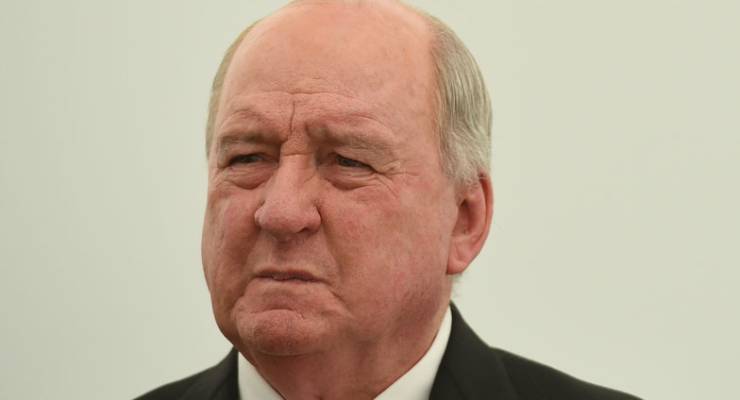
Noted climate sceptic and 2GB radio host Alan Jones is the unlikely public face behind a government-funded “global social purpose movement”, launched to allow citizens to “vote where real funds will go to best rejuvenate and protect” the Great Barrier Reef.
The Citizens of the Great Barrier Reef Initiative’s members include many of the region’s tourism bodies, including Tourism Tropical North Queensland, the Quicksilver Group (which operates cruises on the reef) and the Queensland Music Festival, as well as bodies like James Cook University, the Queensland state government and the federal government. Some of these bodies have made a point of discussing the impact of climate change on the reef — claims Alan Jones spent much of the past two days vehemently opposing on his radio show as he launched the initiative.
He described it on air yesterday as “a positive initiative to deny the Armageddonists” — Jones’ term for those who claim the reef is being irrevocably damaged by climate change and mining –“the opportunity to bad-mouth Australia to the world, and to paint Australia and Australian governments as environmental vandals”. On Monday and Tuesday, Jones broadcast his show from Cairns, reaching, according to the press release, half a million listeners in Sydney and Brisbane. On air, Jones encouraged listeners to give their input into “polishing this jewel”.
Can, and should, discussion of conservation of the Great Barrier Reef take place without mention of climate change? The organisation’s chairman, Alex de Wall, who also heads up Tourism Tropical North Queensland (TTNQ), told Crikey debating climate change wasn’t the point: “Our plans are to engage with Citizens from all persuasions and points of view and to not participate in the debate, but to leverage the passion and focus on the GBR to activate initiatives that positively contribute to its preservation.
“No one, regardless of their point of view, can argue against taking positive action to improve the way we look after our natural environment and the world’s most significant barometer thereof, the Great Barrier Reef,” he said.
During the federal election campaign, the then-nascent Citizens of the Great Barrier Reef initiative was awarded $1.3 million from the federal government to develop what local MP Warren Entsch described as a “one-stop shop where people can learn about the reef and the activities that are underway to make it stronger and more resilient”.
The initiative is putting $1 million of this into its website, which will feature streaming HD video of the reef, a “browser-controlled … submergible drone experience”, a curriculum developed at James Cook University for use in classrooms, as well as a social media campaign to accompany the launch. The other $300,000 is going towards the construction of public artwork, which is also being funded by a further $300,000 from the Cairns Regional Council. Of arguably more promotional value to the campaign than the digital investment has been Jones’ support.
The website aims to reach 100 million people, and to recruit 5 million as “citizens” in the initiative. It hopes to raise $5 million in donations from corporate sponsorship, which “citizens” will then be able to direct towards scientific and conservation projects they support.

In announcing the funding in June, Entsch said the initiative would allow people to express their support for the reef in a meaningful way:
“TTNQ — as the proponent of this concept in conjunction with partners JCU, GBRMPA, RRRC and Reef HQ Aquarium — have really thought outside the box, and have engaged some very innovative marketing avenues. By doing so, COGBR will enable Australia to showcase the fact that the Great Barrier Reef is the world’s best-managed Reef, as well as providing an extraordinary global profile and platform to showcase what is actually being done.”
Talk of coral bleaching has yet to have an impact on visitor numbers to the Great Barrier Reef, though it’s unlikely to count as a positive for marketing purposes. TTNQ says visitor numbers to FNQ are up 13% in the past 12 months.








Alan looks as though he’s caught a whiff of a climate scientist close by. Terrific photo.
But would any climate scientist want to be anywhere near Jones?
“The Reef … damaged by climate change and mining”
It would be more accurate to say that the Reef is being damaged by climate change and farming. As the soil disturbed by farming flows out to sea, it increases the turbidity around the reef. Also, it is profitable to add an excess of nitrogen (as ammonium, nitrate or urea) to the land and let the excess wash out to the sea. There, it fertilises an excess of algae, unbalancing the food chain.
Another pressure on the Reef is the excess of crown of thorns starfish, but that has more to do with the removal of its predators by fishing.
If Jones is involved it is like those false front groups set up in the past by wood chippers, petrol heads, and gun nuts with warm, fuzzy mendacious names.
After all he knows climate change is a hoax, coal is good for humanity and CO2 is…0.00000000001% of…something – he was successfully sued for that claim whilst tongue bathing the mad Monkton.